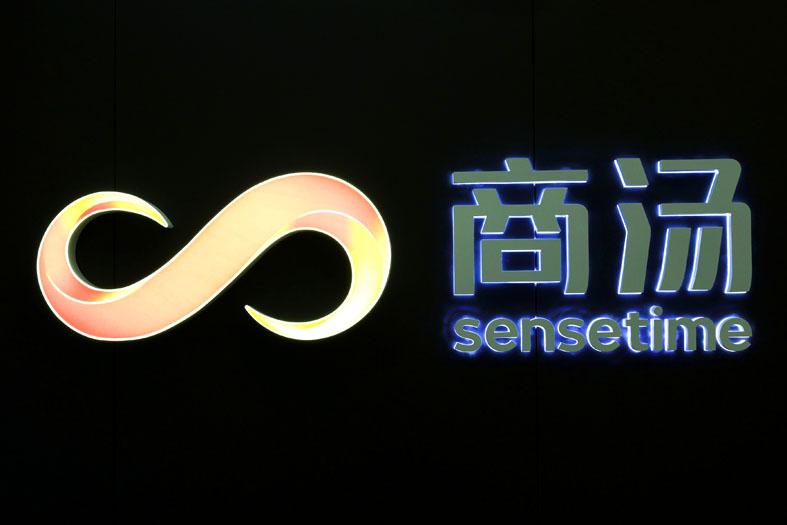China’s biggest artificial intelligence firm SenseTime Group Inc (商湯科技) is seeking to raise as much as US$768 million from a Hong Kong initial public offering (IPO) in a test of investor appetite in volatile stock markets.
The company is offering 1.5 billion shares at HK$3.85 to HK$3.99 apiece, raising nearly HK$6 billion at the top end of the range, the terms of the deal obtained by Bloomberg News showed.
Books opened yesterday, pricing is expected on Friday and listing is slated for Friday next week.

Photo: Reuters
The move comes at a time of increased volatility for listings and amid a drought for big IPOs in Hong Kong.
China Tourism Group Duty Free Corp (中國旅遊集團中免), the world’s largest travel retailer, decided last week to suspend a US$5 billion listing in Hong Kong, citing sluggish capital markets and the COVID-19 pandemic.
The move indicates just how weak sentiment is at the moment, analysts said.
Adding to woes, Chinese shares listed abroad slumped at the end of last week after Didi Global Inc (滴滴) said it would delist in the US and list in Hong Kong.
The stock slumped 22 percent in New York due to the decision and triggered a sixth day of losses for the NASDAQ Golden Dragon China Index, which tracks 95 firms listed in the US that conduct a majority of their business in China.
People familiar with the matter last month told Bloomberg that SenseTime was seeking to raise at least US$1 billion from the share sale.
The Softbank Group Corp-backed company, which makes artificial intelligence technology that interprets images and recognizes faces, started gauging investor demand on Nov. 23, and said in its IPO prospectus that it was not involved in any regulatory probes and had not received any inquiries related to cybersecurity.
Several Chinese IPOs have been directly affected by a wide clampdown by Beijing authorities over companies seeking to go public abroad, including many that hold large amounts of data about Chinese citizens.
Eight cornerstone investors committed to subscribe for US$450 million in SenseTime shares, the terms show, representing about 59 percent of the offering.
They include Mixed-Ownership Reform Fund (US$200 million) and Pleiad Fund (US$50 million).
The Hong Kong Economic Journal reported details of SenseTime’s offering earlier citing listing documents.
China International Capital Corp (中國國際金融), Haitong Securities Co (海通證券) and HSBC Holdings PLC are joint sponsors for SenseTime’s deal.

To many, Tatu City on the outskirts of Nairobi looks like a success. The first city entirely built by a private company to be operational in east Africa, with about 25,000 people living and working there, it accounts for about two-thirds of all foreign investment in Kenya. Its low-tax status has attracted more than 100 businesses including Heineken, coffee brand Dormans, and the biggest call-center and cold-chain transport firms in the region. However, to some local politicians, Tatu City has looked more like a target for extortion. A parade of governors have demanded land worth millions of dollars in exchange

An Indonesian animated movie is smashing regional box office records and could be set for wider success as it prepares to open beyond the Southeast Asian archipelago’s silver screens. Jumbo — a film based on the adventures of main character, Don, a large orphaned Indonesian boy facing bullying at school — last month became the highest-grossing Southeast Asian animated film, raking in more than US$8 million. Released at the end of March to coincide with the Eid holidays after the Islamic fasting month of Ramadan, the movie has hit 8 million ticket sales, the third-highest in Indonesian cinema history, Film

Taiwan Semiconductor Manufacturing Co’s (TSMC, 台積電) revenue jumped 48 percent last month, underscoring how electronics firms scrambled to acquire essential components before global tariffs took effect. The main chipmaker for Apple Inc and Nvidia Corp reported monthly sales of NT$349.6 billion (US$11.6 billion). That compares with the average analysts’ estimate for a 38 percent rise in second-quarter revenue. US President Donald Trump’s trade war is prompting economists to retool GDP forecasts worldwide, casting doubt over the outlook for everything from iPhone demand to computing and datacenter construction. However, TSMC — a barometer for global tech spending given its central role in the

Alchip Technologies Ltd (世芯), an application-specific integrated circuit (ASIC) designer specializing in server chips, expects revenue to decline this year due to sagging demand for 5-nanometer artificial intelligence (AI) chips from a North America-based major customer, a company executive said yesterday. That would be the first contraction in revenue for Alchip as it has been enjoying strong revenue growth over the past few years, benefiting from cloud-service providers’ moves to reduce dependence on Nvidia Corp’s expensive AI chips by building their own AI accelerator by outsourcing chip design. The 5-nanometer chip was supposed to be a new growth engine as the lifecycle